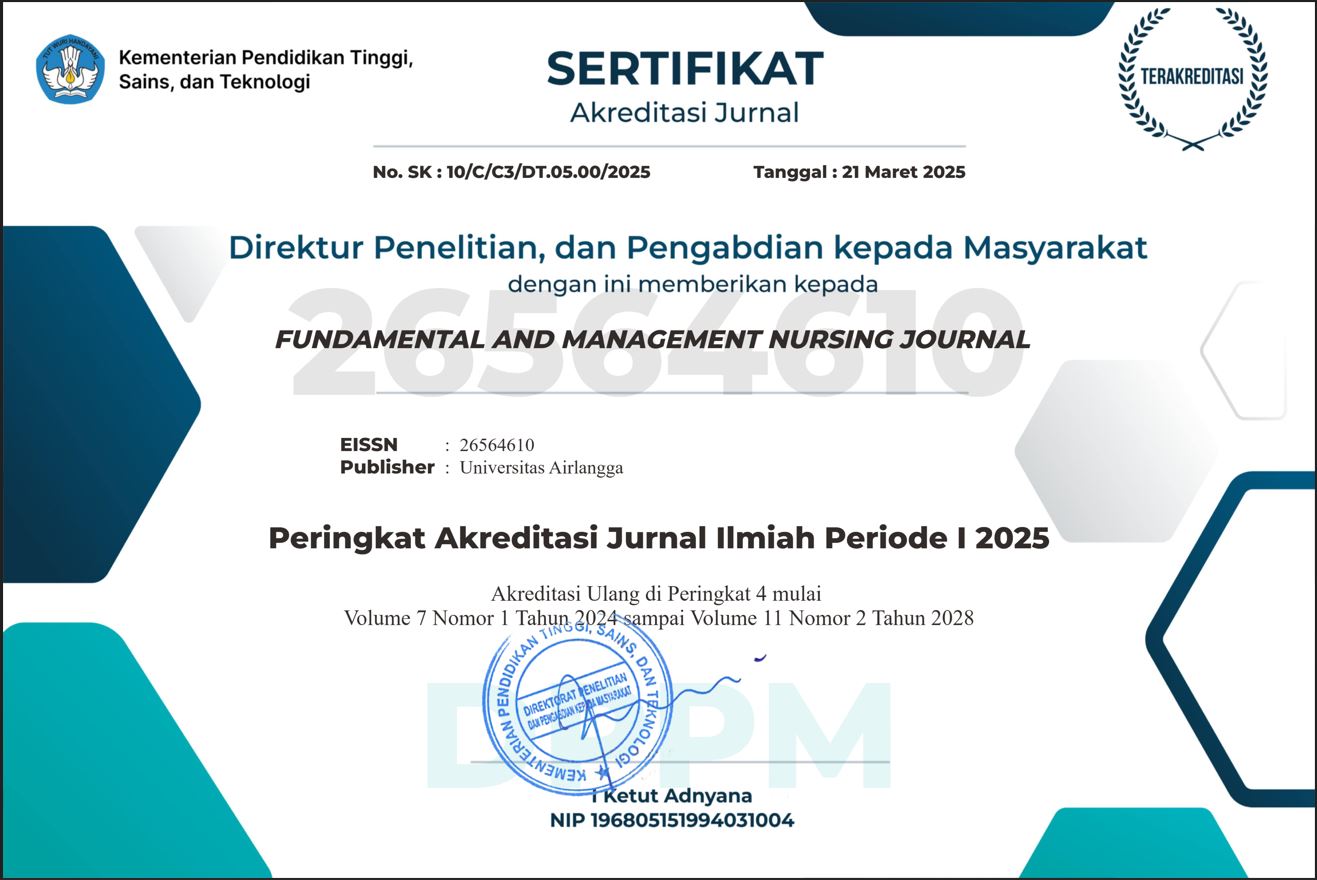Improving Nurse Job Satisfaction in The Handover Process by The Documentation-Based SWITCH Handover Method
Introduction: Implementation of the SWITCH handover method in the Operating Room has traditionally been conducted verbally, without standardized documentation. Effective handover is critical in perioperative settings, where detailed, timely, and accurate communication is essential. To address this issue, this study aimed to evaluate the effect of applying a documentation-based SWITCH handover method on nurse job satisfaction during the handover process.
Method: This study was a a pre-experimental design with a one-group pretest-post-test approach. Independent variable in this study was the application of the documentation-based SWITCH handover method, while the dependent variable was nurse job satisfaction during the handover process. The population consisted of all surgical nurses working in the operating room. A total sampling technique was used, resulting in 41 respondents who met the inclusion criteria. Data were collected using a structured questionnaire designed to measure job satisfaction before and after the implementation of the SWITCH handover method.
Results: The results showed that after the documentation-based SWITCH handover method was applied, satisfied respondents increased to 8 respondents and no respondents felt unsatisfied with the score of mean pretest = 65.98 increase to 70.12 of the mean posttest. The results of the paired t test show that the p value = 0.005 with α = 0.05, this shows that the p value = 0.005 <α = 0.05 it means there is an effect of applying the documentation-based switch handover method to nurse job satisfaction in the operating room.
Conclusion: Nurses should be able to improve their ability to provide services to patients, especially in the handover process by attending seminars or training related to handover so that nurses can carry out their duties better and can feel more satisfied and comfortable at work.
1. INTRODUCTION
Patient safety is an effort that carried out by the hospital to make patient care safer, one indicator of the quality of nursing services at the hospital is effective communication(Reskiki & Ilfa, 2018). Nursing activity services related to effective communication are handover activities in hospitals(Sudrajat et al., 2021). Ineffective communication is commonly found during patient handovers and is considered to be around 65% of the main causes of gaps in patient care, thus impacting nurse job satisfaction and can even cause unexpected events(Sulastien et al., 2021). The implementation of the SWITCH handover method so far has been carried out verbally in the Sidoarjo Hospital operating room and there is still a lack of delivery regarding the patient's condition and the actions to be taken, so the officer needs to reconfirm by telephone to the previous shift and the officer being called becomes uneasy and confused. That's why the implementation of the documentation-based SWITCH handover method needs to be applied so that the handover process becomes more optimal.
Based on data from Patient Safety Incident Reports in Indonesia, it was found that the percentage of types of incidents reported was 38% Near miss, 31% No Harm, and 31% Adverse(Daud, 2020). Trinesa et al., (2020)(Trinesa et al., 2020)in their research explained that the handover process in nursing activities can cause patient safety problems. This is because 80% of these problems cause medical errors. Handover activities that are not accompanied by effective communication can cause errors that can harm the patient. The results of Dalky et al., (2020)(Dalky et al., 2020)show that the application of effective communication during handovers at the Soehadi Priyonegoro Hospital posttest results obtained 31.67, an increase of 40.09 with a p value 0.001 which states that effective communication during handover affects nurse satisfaction. Based on the results of interviews with the head of the Sidoarjo Hospital operating room, it was found that the handover implementation data had used the SWITCH method, but it still could not be applied optimally, due to a lack of understanding by nurses regarding this application.
Nurses are required to have good ability and responsibility in carrying out each of their duties including the ability to collaborate and communicate effectively with patients or also with other health teams. Ineffective communication causes errors in carrying out tasks, so that results are not in accordance with what is expected and can also cause poor relations between nurses and superiors, which in turn causes job dissatisfaction(Hasibuan et al., 2022). Effective communication is implemented in accordance with handover standards. Hand off bedside is carried out so that nurses provide each other with the patient information needed to ensure ongoing care and patient safety, provide opportunities to describe the patient, and ask questions about things that are not yet understood. Effective communication can increase health workers' awareness of the impact of communication on patient safety, satisfaction and communication between health teams increases(Purwaningsih, 2022). One of communication form in the nursing process is handover. Submission of information during the handover is carried out in various ways, one of which is by using the SWITCH method which consists of Surgical Procedures, Fluid (Wet), Surgical Instruments (Instruments), Body Tissue (Tissue), Count (Count), and Validation (Have Any Questions). This documentation-based switch hand over method is an effective communication technique aimed at helping nurses convey more structured and clear information during intraoperative handover. This method is implemented to help the process of good communication between individuals and teams as well as maintain patient safety and minimize patient safety incidents(Mardiana et al., 2019).
The strategy that can be used to reduce errors caused by communication and to improve patient safety is to increase nurses' understanding of the importance of communication during handovers. The method that can be used is by giving coaching to the nurses Coaching is a method of guidance given to achieve the best performance Coaching regarding patient safety is the most important step in ensuring health and attention to the phenomenon of professional communication is very important in reducing the incidence of error. Program coaching effective methods are supported by various factors such as materials, methods and media(Sulastien et al., 2021). Based on the background description, the author tries to study and write it down in the form of a scientific paper with the title "The effect of the application of the documentation-based switch handover method on nurse job satisfaction in the handover process in the Operating Room of Sidoarjo Hospital”.
2. METHODS
2.1 Design
The research design used is Pra experiment with approach Pretest posttest design.
2.2 Population, Sample and Sampling
The research population was all surgical nurses in the operating room of Sidoarjo General Hospital, Indonesia consisting of 46 nurses. The research sample was determined using the Slovin formula which was taken using a simple random sampling technique of 41 respondents. The inclusion criteria for respondents included having worked for 42-48 hours a week and having an account to access electronic medical records (EMR). While nurses who were on leave were excluded from the study.
2.3 Variable
The variable of this research is the application of the switch method handover based on documentation as the independent variable and job satisfaction as the dependent variable.
2.4 Instruments
Data was collected with a questionnaire instrument. The job satisfaction questionnaire in this
Copyright (c) 2025 Ika Suhartanti, Anndy Prastya, Mujiadi Mujiadi

This work is licensed under a Creative Commons Attribution 4.0 International License.
1. The journal allows the author to hold the copyright of the article without restrictions.
2. The journal allows the author(s) to retain publishing rights without restrictions.
3. The legal formal aspect of journal publication accessibility refers to Creative Commons Attribution (CC BY).
















